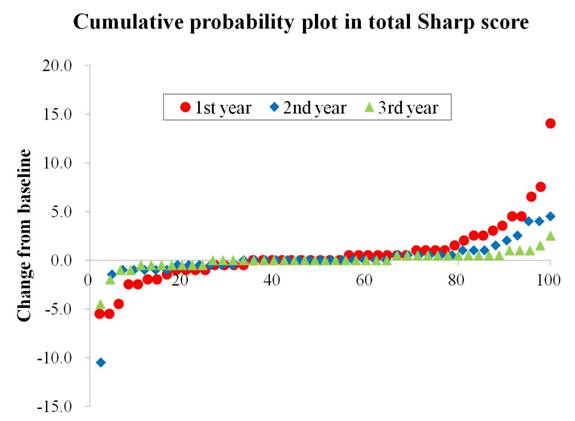Session Information
Session Type: Abstract Submissions (ACR)
Background/Purpose: One of the important therapeutic goals in patients with rheumatoid arthritis (RA) is to halt radiographic progression. Tocilizumab (TCZ), an IL-6 receptor antibody, has been demonstrated that it efficiently improves clinical signs and inhibits structural damages in RA patients. However, it remains unknown what the predictive factor is for long-term radiographic outcomes in RA patients receiving TCZ. The objectives of this study are to assess the structural remission rate and to clarify the predictive factor for long-term radiographic outcomes in patients receiving TCZ under daily clinical practice.
Methods: Michinoku Tocilizumab Study Group comprised 34 institutions in the Northeast region of Japan. RA patients who received 8 mg/kg TCZ every 4 weeks were registered from June 2008 to December 2010 [1]. The clinical and radiographic outcomes were evaluated in 130 patients at 1 year, including 50 patients who received TCZ for 3 years.
Results: Baseline characteristics of patients who received TCZ for 1 year and 3 years, respectively, were as follows: mean age of 59.7/ 58.0 years, the mean disease duration of 10.8/ 10.9 years, the mean DAS28-ESR of 4.8/ 4.8, and 37.7/ 36.0% of patients were taking MTX. Mean change from baseline in van der Heijde-modified total Sharp score (mTSS) was 0.79 at 1 year, and the structural remission rate (
Conclusion: TCZ continuously inhibited radiographic progression in RA patients. SJC within a year could predict long-term radiographic outcomes irrespective of baseline disease activity in patients receiving TCZ.
References: [1] Hirabayashi Y, Ishii T, and the Michinoku Tocilizumab Study Group. The DAS28-ESR cutoff value necessary to achieve remission under the new Boolean-based remission criteria in patients receiving tocilizumab. Clin Rheumatol. DOI 10.1007/s10067-012-2103-4.
Disclosure:
R. Watanabe,
None;
H. Okuno,
None;
T. Ishii,
None;
Y. Hirabayashi,
None;
H. Harigae,
None.
« Back to 2013 ACR/ARHP Annual Meeting
ACR Meeting Abstracts - https://acrabstracts.org/abstract/tocilizumab-efficiently-halts-radiographic-progression-in-patients-with-rheumatoid-arthritis-and-swollen-joint-counts-within-a-year-predict-long-term-radiographic-outcomes-three-year-results-from-mic/

